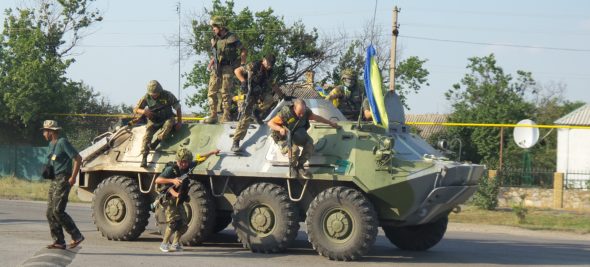The status of the so-called people’s republics in Donbas, occupied by pro-Russian forces, is yet to be settled, even though it has been seven years since the war in eastern Ukraine broke out. The solution to this problem will determine the stability of the Ukrainian power system – writes Dariusz Materniak, contributor to BiznesAlert.pl.
The future of occupied Donbas
The so-called Donetsk People’s Republic (DNR) and Luhansk People’s Republic (LNR) were established in 2014 in result of staged referendums, conducted after parts of the Donetsk and Luhansk oblasts were taken over by pro-Russian militia and Russian military. The republic’s status is not regulated by the Ukrainian law, and they are not recognized as states by the international community (even by Russia). To solve this crisis the so-called Minsk format was established. Four states joined the initiative: Ukraine, Russia, Germany and France. The talks took place at various levels, including those that involved heads of states. In 2014 and 2015 the so-called Minsk protocols were signed, but they did not determine whether the status of the „republics” would be in or outside of Ukraine.
According to the DNR and LNR propaganda it is in the interest of both quasi-states as well as their residents to either integrate with Russia or become independent (at the end of January 2021 the leader of the DNR Denis Pushilin even announced another „referendum” on independence). However, so far Moscow’s policy leads to the conclusion that its preferred solution would be a federalization of the two entities as part of Ukraine, which would enable Moscow to impact Kyiv’s internal and foreign policy. This scenario is unacceptable for the Ukrainian administration, be it under Petr Poroshenko, Volodymyr Zelensky, or any other Ukrainian president or parliament in the foreseeable future. Therefore, the talks on the issue of the occupied Donbas have reached a stalemate that seems endless.
The occupied territory and energy stability
Before the 2014 war, heavy industry and mining were the basis of the Donbas region’s economy. The numerous mines located in both republics went back to work shortly after the main fights stopped. Interestingly, the coal extracted in Donbas was and still is exported not only to Russia (which in view of the economic blockade imposed by Ukraine is the only direct buyer of the product from Donbas), but also to Ukrainian power plants and CHP plants, as well as to, among others, Belgium, Romania, Turkey and Poland (it is imported on the basis of forged documents as coal from Russia, but the profits go to, among others, pro-Russian separatists in Donbas).
In 2020 Ukraine imported from Russia coal worth USD 1.04 billion. Ukraine’s media regularly report about new deliveries from Russia, e.g. according to a Ukrainian blogger, on the 17th of January 2021 dozens of freight cars filled with coal imported from Donbas and Russia were waiting on the Darnica train station in Kyiev to be unloaded. Importantly, this is regular a practice, not an individual event, and it has been going on since the beginning of the conflict in eastern Ukraine, This is one of the reasons why on the 2nd of February, the Ukrainian President Volodymyr Zelensky decided to impose fines on Taras Kozak, an MP from the Opposition Platform — For Life for participating in the organization of coal deliveries from occupied Donbas. The sanctions were also imposed on TV channels linked to the Platform and Viktor Medvedchuk, including 112-Ukraina, Newsone and ZIK.
These decisions do not impact the fact that Ukraine’s power industry is facing significant issues when it comes to its ability to maintain a steady supply of coal and, consequently, a stable generation of electricity, especially in the winter. Due to warm winters in the previous years the problem was not that evident, but it strongly emerged in the 2020/2021 season. On the 28th of January UkrEnergo announced the coal reserves were lower than the level necessary for ensuring energy security and amounted to 455 thousand tons (reservers are lower than 522 thousand t, including 51 thousand tons of hard coal and 471 thousand tons of fat coal).
On the 1st of February 2021 Ukraine restarted power imports from Russia (the end user is a company from Odessa that owns, among others, shopping centers). It remains to be seen for how long such import will be allowed, as the acting Energy Minister Yuriy Vitrenko announced his goal is to make Ukraine completely independent of the energy market in Russia and Belarus. Despite such declarations, the imports may turn out to be necessary to maintain Ukraine’s energy stability, irrespective of political goals and the desire to limit economic relations with Russia as much as possible. It may turn out that the alternative is stopping power supply to some consumers during peak energy demand.









